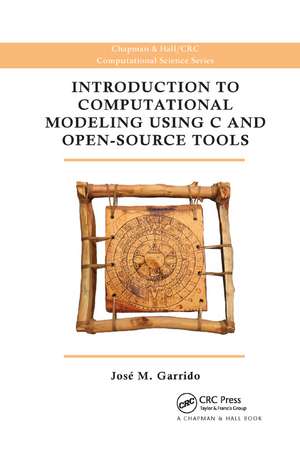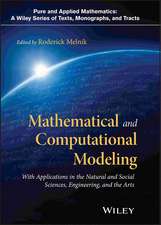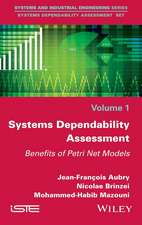Introduction to Computational Modeling Using C and Open-Source Tools
Autor Jose M. Garridoen Limba Engleză Paperback – 19 iun 2019
The book first presents an overview of problem solving and the introductory concepts, principles, and development of computational models before covering the programming principles of the C programming language. The author then applies programming principles and basic numerical techniques, such as polynomial evaluation, regression, and other numerical methods, to implement computational models. He also discusses more advanced concepts needed for modeling dynamical systems and explains how to generate numerical solutions. The book concludes with the modeling of linear optimization problems.
Emphasizing analytical skill development and problem solving, this book helps you understand how to reason about and conceptualize the problems, generate mathematical formulations, and computationally visualize and solve the problems. It provides you with the foundation to understand more advanced scientific computing, including parallel computing using MPI, grid computing, and other techniques in high-performance computing.
| Toate formatele și edițiile | Preț | Express |
|---|---|---|
| Paperback (1) | 483.19 lei 6-8 săpt. | |
| CRC Press – 19 iun 2019 | 483.19 lei 6-8 săpt. | |
| Hardback (1) | 1000.71 lei 6-8 săpt. | |
| CRC Press – 13 noi 2013 | 1000.71 lei 6-8 săpt. |
Preț: 483.19 lei
Preț vechi: 603.98 lei
-20% Nou
Puncte Express: 725
Preț estimativ în valută:
92.47€ • 96.18$ • 76.34£
92.47€ • 96.18$ • 76.34£
Carte tipărită la comandă
Livrare economică 14-28 aprilie
Preluare comenzi: 021 569.72.76
Specificații
ISBN-13: 9780367379230
ISBN-10: 0367379236
Pagini: 464
Dimensiuni: 156 x 234 x 25 mm
Greutate: 0.66 kg
Ediția:1
Editura: CRC Press
Colecția Chapman and Hall/CRC
ISBN-10: 0367379236
Pagini: 464
Dimensiuni: 156 x 234 x 25 mm
Greutate: 0.66 kg
Ediția:1
Editura: CRC Press
Colecția Chapman and Hall/CRC
Public țintă
Professional Practice & DevelopmentCuprins
Problem Solving and Computing. Programs. Modular Decomposition: Functions. More Concepts of Computational Models. Algorithms and Programs. Selection. Repetition. Arrays. Pointers. Linked Lists. Text Data. Computational Models with Arithmetic Growth. Computational Models with Quadratic Growth. Models with Geometric Growth. Computational Models with Polynomials. Models with Interpolation and Curve Fitting. Using Vectors with the GSL. Matrices and Sets of Linear Equations. Introduction to Dynamical Systems. Linear Optimization Modeling. Solving Linear Optimization Problems. Sensitivity Analysis and Duality. Transportation Models. Network Models. Integer Linear Optimization Models. Appendices.
Notă biografică
José M. Garrido is professor in the Department of Computer Science at Kennesaw State University. Dr. Garrido’s research focuses on object-oriented modeling and simulation, multidisciplinary computational modeling, formal specification of real-time systems, language design and processors, and modeling systems performance. He developed the Psim3, PsimJ, and PsimJ2 simulation packages for C++ and Java as well as the Object-Oriented Simulation Language (OOSimL). He received a Ph.D. from George Mason University.
Descriere
This book presents the fundamental principles of computational models from a computer science perspective and explains how to implement the models using the C programming language. Emphasizing analytical skill development and problem solving, the book helps readers understand how to reason about and conceptualize the problems, generate mathematical formulations, and computationally visualize and solve the problems. It provides the foundation to understand more advanced scientific computing, including parallel computing using MPI, grid computing, and other techniques in high-performance computing.










